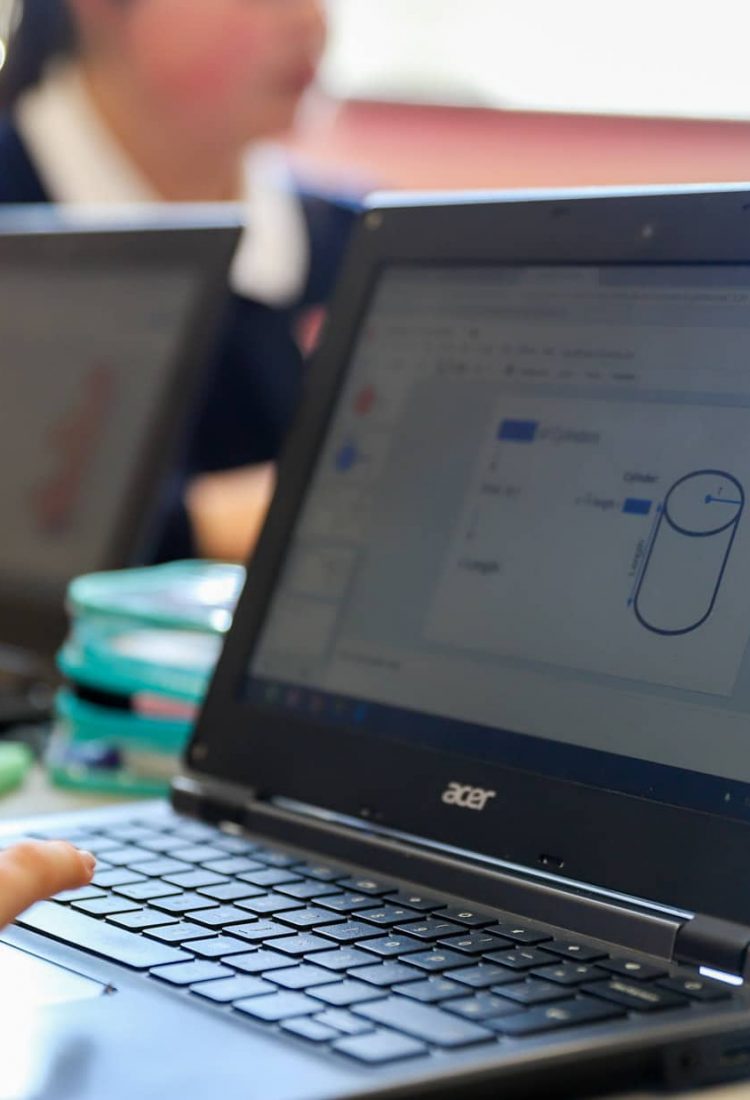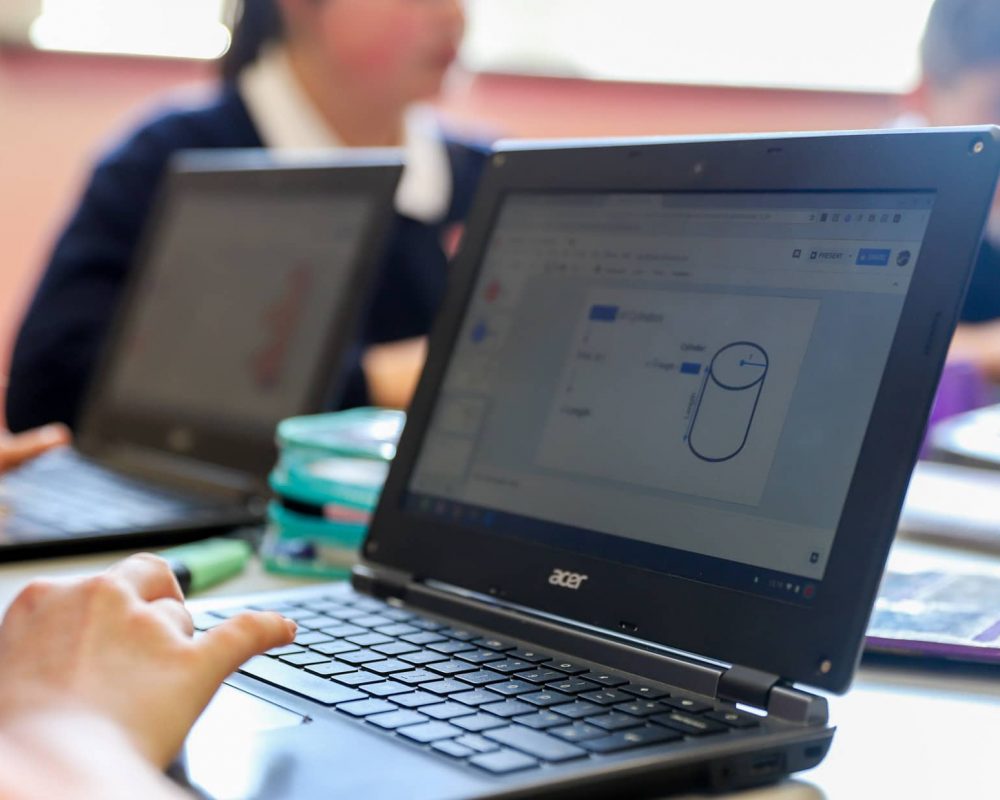Head of Department: Mrs J Barnhoorn
Other members of staff:
- Karl Butler (Second In Maths)
- Rachael Brooks
- Karen Hall
- Laura Little
- Edward Mudd (Lead for Further Maths GCSE, Core Maths and Enrichment)
- Bethany Outlaw (KS3 Lead)
- Danielle Scagell
- Rachel Scott
- Paul Sutton
Everything comes down to maths…
Mathematics has a cultural background that stretches back millenia; from the early development of number systems through to the technological world we live in today.
The skills and knowledge delivered through our maths curriculum enable Churston students to operate successfully in life and work, managing their money, running their homes and thriving as active citizens in society.
The applications of maths are so diverse that it underpins many areas of the curriculum, from the more obvious Science and Design Technology, through to Music, Social Sciences and Textiles.
Maths teaches us to recognise patterns, generalise and make predictions by abstracting a problem to its essential form and breaking it into smaller manageable elements that can then lead to a solution.
We want all students at Churston to feel supported and challenged in their learning so that they develop the confidence to approach unfamiliar situations with a firm foundation of having solved a wide variety of problems before. They will be able to formulate their own relevant questions, research the answers to these questions and use their findings to problem solve.
By maintaining high expectations and encouraging all students to achieve their potential, the Churston maths department strives to facilitate social justice for all learners and to share their passion and commitment to this fundamental subject.
What we do
Students will cover the following broad areas: number; algebra; ratio and proportion; geometry and measures; probability and statistics. CFGS Maths Overview.
The curriculum has a ‘spiral’ design which enables students to deepen their understanding as they build on their prior knowledge. In year 7 and 8 there is a focus on developing mathematical proficiency and as students progress into year 9 they will start to solve more complex problems involving several topics.
The scheme of work highlights prior knowledge and where the topic is going, so students have multiple opportunities to see and make connections. By encouraging students to think about concepts in relation to one another, as opposed to individually, we can then help them develop strong mathematical schemas.
The curriculum is ambitious and to aid us in supporting and challenging all of our students appropriately, we set students within two populations in years 8 – 11. Grouping by ability enables teachers to adapt the core curriculum to suit the needs of their class and the individual students within their class, thus helping all students achieve their potential in a supportive environme
Year 7 | Year 8 | |
|---|---|---|
Autumn 1 | Number: operations with integers, rounding and estimation Algebra: language, collect like terms, substitution, expand brackets | Algebra: indices laws, factorising, construct and solve linear equations |
Autumn 2 | Shape: properties of quadrilaterals, angle facts Number: simplifying, ordering and 4 operations with fractions | Shape: area & circumference of circle, volume & surface area of prisms, transformations |
Spring 1 | Algebra: Factorising expressions, form and solve linear equations Number: operations with decimals, percentages of amounts | Number: percentage change, repeat percentage change Data: mutually exclusive events, probability diagrams including tree diagrams |
Spring 2 | Data: averages, collecting and displaying data EOY assessment | Shape: introduction to Pythagoras Number: Prime factor decomposition, HCF & LCM using Venn EOY assessment |
Summer 1 | Ratio: sharing in a given ratio, best buy problems Number: percentage increase & decrease Algebra: using and finding general rule for sequences | Algebra: plot linear graphs, gradient, y=mx+c, parallel & perpendicular lines |
Summer 2 | Algebra: introduction to linear graphs Data: pie chart, time series, scatter graph, introduction to probability | Shape: congruent & similar shapes, introduction to bearings, scale drawings |
Careers
Maths can lead into a variety of careers, from engineering and computing to medical research. Employers value success in maths because it shows that you can problem solve as well as apply and understand complex processes. So you may not use the mathematical process itself but a strong understanding of maths demonstrates you are able to apply methods and solve complex problems.
Mathematicians are often appreciated for their logical thinking; their ability to model problems; to make predictions and their perseverance!
SMSC
The study of mathematics enables us to make sense of the world around us. Developing deep thinking and an ability to question the way in which the world works, mathematics is a tool that we can use to explore the man-made and natural world we live in.
Students are provided with opportunities to apply their maths skills to a variety of real life contexts. For example, analysing data and considering the implications of misleading or biased statistical calculations.
Students are encouraged to explain concepts to each other, within class and through older students volunteering as mentors, which promotes discussion and the importance of clear communication.
Maths can present us with challenges that require us to think critically and creatively, so over time we develop our mathematical resilience and perseverance and recognise the feeling of success when we overcome difficulties.
Maths is a universal language with a myriad of cultural inputs throughout the ages.
Student testimonies
“Maths in year 10 is challenging, but the standard of teaching is high and the content is taught thoroughly, so it is rewarding despite being difficult at times.” Alice (Year 10)
“Learning maths at Churston is great as it goes at a good pace and it is taught well. The lessons are structured well and there is a good variety of what we do in them e.g. exam questions or just practice questions” Evie (Year 10)
“Maths is important because it teaches you to be logical and a critical thinker. Maths at Churston is a challenging and rewarding experience” Max (Year 11)


